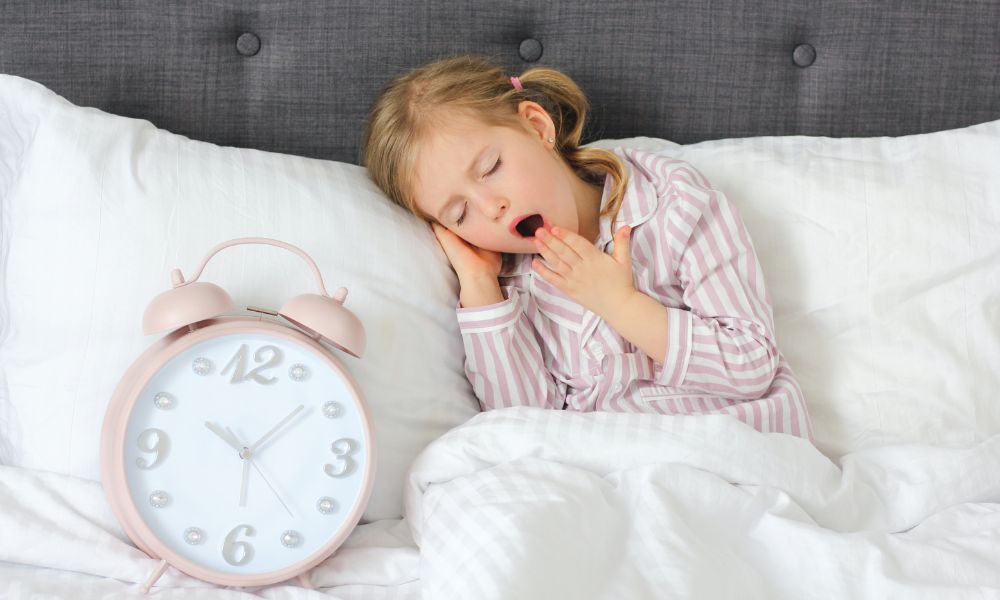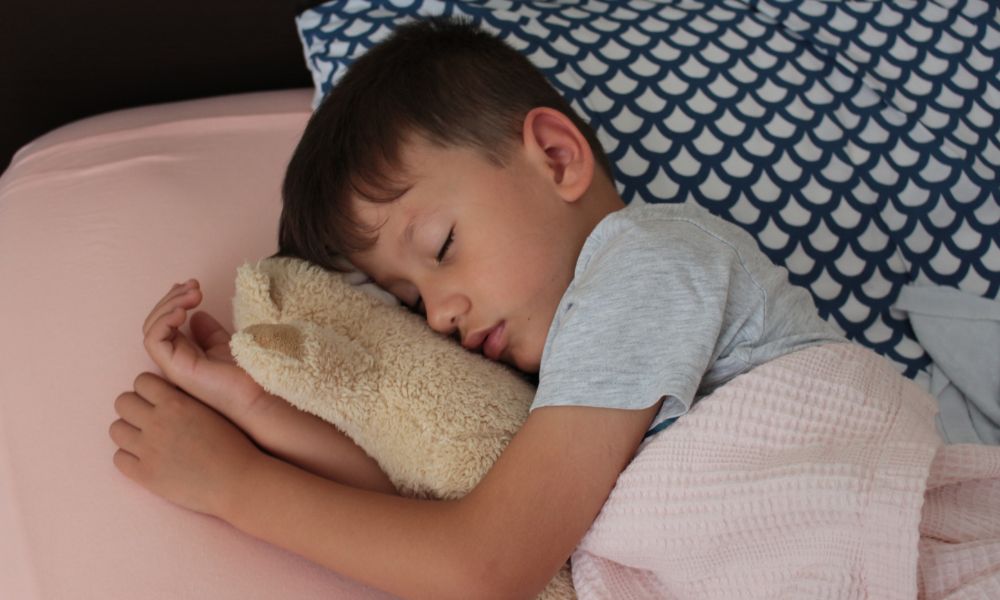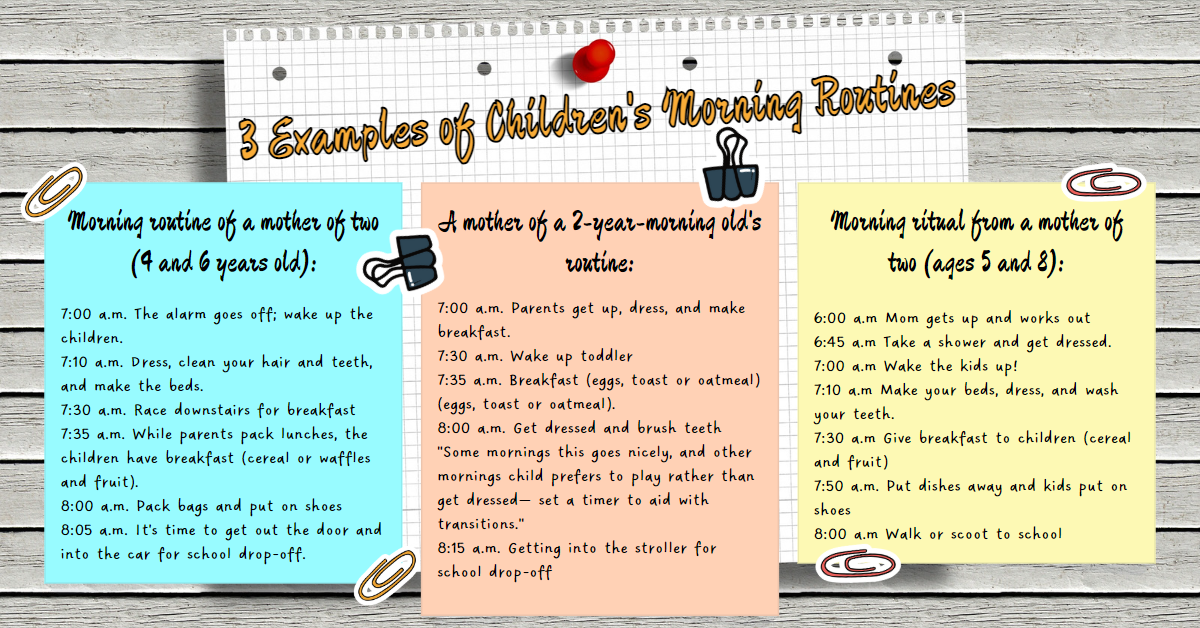
03 Jan Morning Routines for Children
MORNING ROUTINES FOR CHILDREN

What should children’s morning routines be like?
The phrase “routine” has a poor image of being aggressive, repetitive, and tiresome. Many perceive it as a “strict, unchangeable set of tasks, expected to be completed at whatever cost,” especially if you’re a working professional caught in your routines.
If routines are regarded in this way, it is reasonable that parents are hesitant to set one for their children. But this doesn’t have to be the case. Learn why a regular schedule is essential for your child.
Why Is a Morning Routine for Children Important?
It may appear ridiculous to some of us. You might ask, “Why to focus so much on generating these patterns in our home?” Isn’t life hectic enough? Why add to the anxiety? Because creating a morning routine for children has the opposite effect. It works to your advantage to reduce stress, save time, alleviate tension, keep life organized, simplify your schedule, and build habits in your kids that promote self-discipline and character.
Good morning rituals are about removing impediments rather than adding more to your plate. It helps each member of the family to be successful in their undertakings. It promotes organization and, as a result, more family time together.
The first thing to remember is that the morning routine for children will only be effective if you follow one yourself. Kids pay greater attention to what we do than they do to what we say. If we do not model the behaviors and choices that we demand of them, they will lose respect for us and never acquire a feeling of value in the excellent habits that we are attempting to teach them.
How To Implement a Morning Routine for Children?

Creating a morning routine for children might be daunting if you have never had any order in your life. Remember that everyone starts from scratch when developing new habits.
Here are some pointers for developing realistic morning routines for children that will function and last.
1. Begin Small
When developing new morning routines for children, the essential thing to remember is to start small and expand from there. Adults cannot go from zero to sixty when establishing new behaviors, so expecting your children to do so is ridiculous.
When developing morning routines for children, begin with ONE habit. They should practice it every day until they have mastered it. Then, to the procedure, add another component.
For example, you might make placing their pajamas in dirty clothes hamper the first step in their regimen. Give them ONE task to complete on their own and assist them with everything else.
Add another item to the morning routines for children after a few days (when you no longer need to remind them to execute that specific behavior). Your children will eventually be able to do their whole morning ritual on their own.
2. Involve Your Children in Routine Development
You should incorporate your children while developing a morning routine for children, just like a teacher would with her students. When children have a voice in what they do, they are more likely to stay to it. They will also be more eager to cooperate without a fuss.
Sit together as a family and explore ways to make mornings flow more smoothly. Encourage your children to consider strategies that develop independence. Play it out loud! Make them believe it is the nicest thing in the world that they will be “big boys and girls” performing things to assist you! Make a list or a chart together, and then begin executing the routine step by step.
3. Get a Restful Night’s Sleep

A good night’s sleep is the foundation of a happy morning. Depending on their age, children require 8-12 hours of sleep. I understand that this is easier said than done. Keep a steady pattern to ensure that kids receive enough sleep.
4. Get Ready the Night Before
One of the simplest ways to make mornings less chaotic is to prepare as much as possible ahead of time. Ask yourself the basic question, “What can I do tonight to make tomorrow a bit easier?” then carry it out! Your future self will appreciate it.
Here are a few easy things you can do at night to make your mornings go more smoothly:
- Layout clothes- If your children wear uniforms, this step is a bit easier. If not, take 5 minutes to select an outfit and place it in a designated location. If your child is old enough, let them help you choose what they will wear.
- Lunch Prep- Get as much of your lunch prep done the night before. Pack beverages and napkins, as well as make sandwiches and wash and chop fruit.
- Pack Bags and Extracurricular Activity Supplies- Before your children go to bed, make sure their backpacks are packed and any items they may need for after-school activities. Please make sure you complete any paperwork or sign any papers that need to be signed so they can put them in their bags.
5. Get Up Before Your Children
While this recommendation is more for you than your children, getting up early will help your morning flow more smoothly. This may be easier said than done, especially if you have a child that wakes up before the sun.
More power to you if you prefer waking up hours before your children to work out and shower! For those of us who love sleeping in a bit longer, the objective is to get up 15-20 minutes before your kids.
Take some quiet time to sip a cup of coffee. Prepare yourself for the day by getting dressed. Prepare yourself mentally for the chaos about to erupt when your children get up. Preparing ahead of time will allow you to focus entirely on your children once they are awake.
6. Make Waking Up Exciting
How you feel when you get up sets the tone for the rest of your day. Nothing is more annoying than waking up on the wrong side of the bed. Remember that the first seconds your children wake up are some of the most essential moments of their whole day. There are several methods to assist your children in waking up in a better mood: morning snuggles, music (hello, Alexa), and dance parties are all enjoyable ways to get your children happy and moving.
7. Make use of timers

When it comes to productivity, timers are a secret weapon. Use timers all the time, whether cleaning the house or doing a chore. It assists in staying on track and focused on the work at hand.
8. Display the Routines
Having a visible morning routine checklist for kids is an excellent method to keep your children on track each day, especially in the beginning. Try using a velcro routine chart to ensure they do all their morning duties. It’s a race to see who can complete them first.
9. Make a Morning Basket
To save the time it takes the kids to get ready in the morning, store everything you could need in one place. Maintain a basket in the kitchen drawer with some of the most often-used things. A hairbrush, hair ties, toothpaste, toothbrushes, sunscreen, lotion, and bandaids are among the things you might want to keep handy.
Keep the basket in the bathroom for older children. The trick is to have everything in one location to expedite the process.
10. Minimize Distractions
If you want your children to focus on their morning routine and get things done, you should strive to prevent distractions as much as possible. It includes items such as televisions, iPads, toys, and games.
11. Make a Healthy Breakfast Available
Breakfast is said to be the most important meal of the day. Make sure your kids are well-fueled for the day by serving them a protein-rich breakfast. If you’re pressed for time in the morning, try packing breakfast the night before so your children may eat on the way to school.
12. Positive Affirmations towards the end of the day
Regardless of how your morning went, make it a practice to conclude it with positive affirmations. Please take 2 minutes before sending your children to school or moving on to the next part of the day to get them in the appropriate frame of mind.
3 Examples of Morning Routines for Children
Here are a handful of suggestions to get you started on your own morning routine—you know, for the benefit of your family (and your mental health).
Morning routine of a mother of two (4 and 6 years old):
7:00 a.m. The alarm goes off; wake up the children.
7:10 a.m. Dress, clean your hair and teeth, and make the beds.
7:30 a.m. Race downstairs for breakfast
7:35 a.m. While parents pack lunches, the children have breakfast (cereal, waffles, and fruit).
8:00 a.m. Pack bags and put on shoes
8:05 a.m. It’s time to get out the door and into the car for school drop-off.
A mother of a 2-year-old’s morning routine:
7:00 a.m. Parents get up, dress, and make breakfast.
7:30 a.m. Wake up toddler
7:35 a.m Breakfast (eggs, toast, or oatmeal) (eggs, toast, or oatmeal).
8:00 a.m. Get dressed and brush your teeth. “Some mornings, this goes nicely, and other mornings child prefers to play rather than get dressed— set a timer to aid with transitions.”
8:15 a.m. Getting into the stroller for school drop-off
Morning ritual from a mother of two (ages 5 and 8):
6:00 a.m. Mom gets up and works out
6:45 a.m. Take a shower and get dressed.
7:00 a.m. Wake the kids up!
7:10 a.m. Make your beds, dress, and wash your teeth.
7:30 a.m. Give breakfast to children (cereal and fruit)
7:50 a.m. Put dishes away and kids put on shoes 22
8:00 a.m Walk or scoot to school
Craig Selinger
Latest posts by Craig Selinger (see all)
- Psychotherapy and Support Services at Cope With School NYC - April 12, 2024
- NYC Parents of Teens Support Group - April 8, 2024
- Here I Am, I Am Me: An Illustrated Guide to Mental Health - April 4, 2024


No Comments